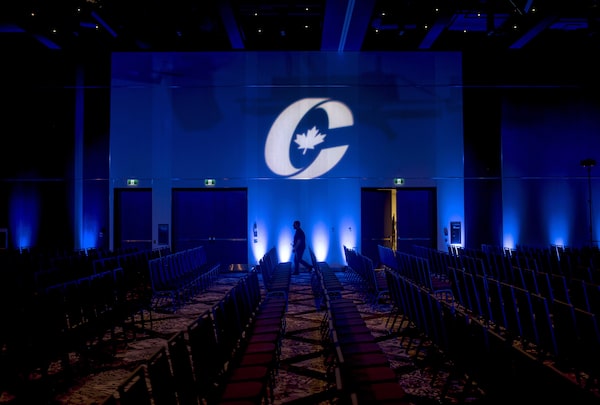
A man is silhouetted walking past a Conservative Party logo before the opening of the Party's national convention in Halifax on Aug. 23, 2018.Darren Calabrese/The Canadian Press
Conservative Party officials could hardly contain their excitement. It was the summer of last year, in the middle of the federal leadership race. The party, they announced, had sold some 613,000 new memberships by the June 3 cutoff date – more than twice the previous record, set during the 2020 leadership race, and several times more than any other party had ever sold.
Observers struggled to explain this extraordinary surge in interest in selecting the leader of a thrice-defeated opposition party. Was it the candidates? Was it the party’s policies? Discontent with the governing Liberals? The ease of purchasing online?
It now appears there may have been another contributing factor. They may have had help. Reporting in recent weeks by the journalist Sam Cooper has revealed CSIS’s concerns that the governments of China and India were active participants in the race, notably as buyers of party memberships.
According to Mr. Cooper, a top-secret intelligence assessment from October, 2022, “strongly suggests” Beijing “financially infiltrated the federal Conservative’s 2022 leadership contest.” Specifically, Mr. Cooper quotes the document as saying China attempted, through proxies, “to elect a federal party’s new leader, purchasing party memberships to support an unidentified candidate, with the objective of tempering the federal party’s perceived ‘anti-China’ stance.”
Separately Mr. Cooper reports, based on the same document, that agents of the government of India also “appear to have interfered in the Conservatives’ 2022 leadership race.” He quotes CSIS as saying India provided ”support to an elected Canadian politician’s campaign for the leadership of a political party in Canada, by securing party memberships for that campaign.”
The reports are noteworthy in two respects. First, they significantly broaden the already sprawling foreign interference story. Until now the focus of news reports, based on intelligence leaks, has been mostly but not exclusively on Chinese attempts to exert influence within and on behalf of the federal Liberals: supporting certain candidates, smearing others, and so on.
If China, and as it is now alleged India, were also attempting to influence the Conservatives, on the scale these latest reports suggest – intervening not just in particular ridings or nomination races but in the choice of party leader – it raises the question of whether not only the Liberals, but the Conservatives, might have something to hide.
And other parties, perhaps, as well. The intelligence assessment quotes a proxy agent of India boasting “that they are providing electoral support – including significant amounts of money – to a number of politicians at all levels of government.”
Likewise, according to Mr. Cooper, it says “a senior Canadian politician running to lead a provincial political party clandestinely met officials inside a Chinese Consulate” in June, 2022. Which provincial parties had leadership campaigns at that time? Alberta’s United Conservative Party – and B.C.’s NDP.
This has serious ramifications for the integrity, real or perceived, of the public inquiry into foreign interference. The inquiry’s terms of reference were set, you’ll recall, after lengthy negotiations between the major federal parties – at least two of whom, if the concerns in the CSIS Intelligence Assessment hold water, might have reason to prefer the inquiry did not probe too deeply into the matter.
Second, the reporting sheds disturbing new light on the degree to which Canadian political parties have exposed themselves to foreign infiltration and manipulation via their longstanding practice of conducting leadership races as high-volume membership drives.
The democratic deficiencies of this peculiar method of choosing a leader have long been apparent. Far from “the members” selecting the leader, the choice is as often as not decided by thousands of instant members, with no connection to the party prior to voting day and scarcely more afterward. Once chosen by this cloud of mist, the leader is essentially accountable to no one, while members of caucus are obliged to submit to the near-absolute rule of someone they had not the least hand in choosing.
Equally well known is the potential for mischief. The history of Canadian politics is sadly rife with stories of stacked nomination or delegate selection meetings, filled by busloads of elderly drunks or worse. Long-time party members are often bewildered to find themselves stuck with leaders chosen by sudden influxes of single-issue, even hostile interest groups: for example, the Quebec dairy farmers who made Andrew Scheer federal Conservative leader in 2017.
Until now, however, the issue was mostly entryism, tinged with corruption. But where once we might have worried, at worst, that dead people were voting, we now have to reckon with the possibility that foreign powers are conspiring to choose our leaders, with or without the connivance of the candidates.
Bring on the public inquiry. Put all the parties on the witness stand. Let’s get to the bottom of this, if we can.
 Andrew Coyne
Andrew Coyne